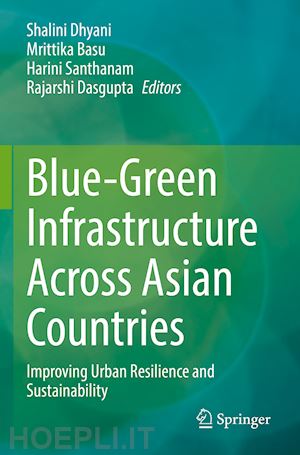
Questo prodotto usufruisce delle SPEDIZIONI GRATIS
selezionando l'opzione Corriere Veloce in fase di ordine.
Pagabile anche con Carta della cultura giovani e del merito, 18App Bonus Cultura e Carta del Docente
This edited book discusses Blue-Green Infrastructure (BGI) from conception to implementation in building resilience and urban sustainability. The book emphasizes on infrastructures, institutions, and perceptions as three main pillars of implementing and managing successful BGI, with a special focus on Asia. The book highlights concepts as well as field-based experiences from different parts of Asia by experts, with a special focus on advances and opportunities in advancing BGI, challenges and constraints, followed by case studies on BGI mainstreaming. It addresses sustainable water management, multiscale environmental design, environmental risk assessment, and finally understanding policy implications and concerns for BGI mainstreaming in growing urban sprawls of the region. There has been growing global momentum and recognition of Blue-Green Infrastructure (BGI) as a multifunctional Nature-based Solution (NbS) with multiple co-benefits. There is strong evidence from many urban centres of Europe, USA, China, and South Africa demonstrating that mainstreaming BGI can help in addressing growing vulnerability of urban areas by ensuring safety, resilience, and sustainability for urban residents in the warming world. This book is a timely contribution for researchers, students, scholars, urban planners, consultants, and policy makers in the fields of environment, resilience, urban planning, climate adaptation, and sustainability science.
Dr. Shalini Dhyani is Senior Scientist in Critical Zone Research Group of CSIR-National Environmental Engineering Research Institute (NEERI) India. She is South Asia Regional Chair for IUCN Commission on Ecosystems Management (CEM) and also serves as Lead author for Thematic Assessment on Sustainable Use of Wild Species by IPBES. She has extensively worked on the interlinkages between socio-ecological systems through sustainability science approaches. Her research interest is science-policy integration for better biodiversity and ecosystem-inclusive decision-making for disaster risk reduction, climate change adaptation, mitigation and sustainable development in natural and urban ecosystems. She has several peer reviewed publications to her credit.
Dr Mrittika Basu is an Assistant Professor in the Graduate School of Global Environmental Studies, Kyoto University, Japan. Her research interests are in the field of ecosystem services, relational values, and the well-being of communities, particularly under the rapidly changing landscapes of Asia. Currently, she is working on multiple projects on nature connectedness and biophilia assessment among school children and urban residents in India and Japan. She has published several peer-reviewed scientific papers in internationally acclaimed journals and also served as a contributing author (CA) in the Intergovernmental Panel on Biodiversity and Ecosystem Services (IPBES) Global Assessment Report (2015–18).
Dr. Harini Santhanam is an Assistant Professor with the National Institute of Advanced Studies, Bangalore, India, studying multiple aspects of aquatic systems such as biogeochemistry, hydrological processes, and land-water-human nexus. She has been a long-term researcher with IISc Bangalore, working in multi-disciplinary teams on analytical and ecosystem modelling techniques. Her research interests are multidisciplinary, bringing togetherinsights from aquatic biogeochemistry, ecosystem vulnerability, adaptability and resilience, with an emphasis on coastal and marine ecosystems. Her work also encompasses the use of novel environmental proxies and indices. Further, she investigates the challenges towards the sustainable development of aquatic systems by adopting nature-based solutions.
Dr Rajarshi Dasgupta is a Senior Researcher at the Institute for Global Environmental Strategies, Kanagawa, Japan. He holds diverse research interests in the field of landscape ecology and planning, including Ecosystem-based Disaster Risk Reduction, development of socio-ecological scenarios, participatory conservation, and social forestry. He has worked extensively with communities in South and Southeast Asia, with major research experience in India, Japan, Myanmar, Bangladesh, Thailand and the Philippines. He also served as a lead author for IPBES Asia-Pacific Regional Assessment (2015-18), Sustainable Use of Wild Species Assessment (2018–21), and chapter scientist cum contributing author for IPCC’s Sixth Assessment report.











Il sito utilizza cookie ed altri strumenti di tracciamento che raccolgono informazioni dal dispositivo dell’utente. Oltre ai cookie tecnici ed analitici aggregati, strettamente necessari per il funzionamento di questo sito web, previo consenso dell’utente possono essere installati cookie di profilazione e marketing e cookie dei social media. Cliccando su “Accetto tutti i cookie” saranno attivate tutte le categorie di cookie. Per accettare solo deterninate categorie di cookie, cliccare invece su “Impostazioni cookie”. Chiudendo il banner o continuando a navigare saranno installati solo cookie tecnici. Per maggiori dettagli, consultare la Cookie Policy.